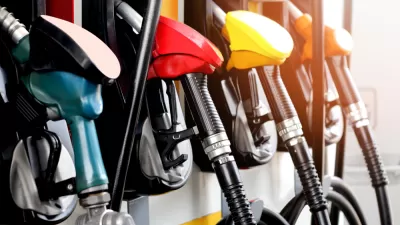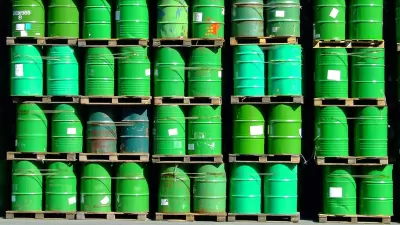'Peak oil' refers to a belief that growing oil demand will outstrip finite oil supplies. Peak U.S. oil consumption is premised on the belief that 2007 marked the peak, population increase notwithstanding, due to efficiency, biofuels and batteries.
"Drivers filled their cars with 371.2 million gallons of petroleum-based gasoline every day in 2007, according to the U.S. Energy Information Administration. It expects that to fall 6.9% to 345.7 million gallons in 2009, as demand at the pump declines and the use of plant-based ethanol increases. Even if usage climbs after the recession ends, it won't exceed 2007 levels, according to EIA forecast.
Demand for all petroleum-based transportation fuels -- gasoline, diesel and jet fuel -- fell 7.1% last year, according to the U.S. EIA. This is the steepest one-year decline since at least 1950, as far back as the federal government has reliable data.
Many industry observers have become convinced the drop in consumption won't reverse even when economic growth resumes. In December, the EIA said gasoline consumption by U.S. drivers had peaked, in part because of growing consumer interest in fuel efficiency.
Exxon believes U.S. fuel demand to keep cars, SUVs and pickups moving will shrink 22% between now and 2030. "We are probably at or very near a peak in terms of light-duty gasoline demand," says Scott Nauman, Exxon's head of energy forecasting.
Skeptics of the notion that gasoline demand has peaked point to a population that is likely to keep growing as Americans have children at roughly the same pace and the flow of immigrants increases. "Anyone who looks at population must think there is going to be some big bird flu if they think we've peaked," says Tom Kloza, chief analyst at Oil Price Information Service, a firm in Wall, N.J., that tracks prices and consumption."
Thanks to Mark Boshnack
FULL STORY: Oil Industry Braces for Drop in U.S. Thirst for Gasoline

Alabama: Trump Terminates Settlements for Black Communities Harmed By Raw Sewage
Trump deemed the landmark civil rights agreement “illegal DEI and environmental justice policy.”

Study: Maui’s Plan to Convert Vacation Rentals to Long-Term Housing Could Cause Nearly $1 Billion Economic Loss
The plan would reduce visitor accommodation by 25% resulting in 1,900 jobs lost.

Planetizen Federal Action Tracker
A weekly monitor of how Trump’s orders and actions are impacting planners and planning in America.

Wind Energy on the Rise Despite Federal Policy Reversal
The Trump administration is revoking federal support for renewable energy, but demand for new projects continues unabated.

Passengers Flock to Caltrain After Electrification
The new electric trains are running faster and more reliably, leading to strong ridership growth on the Bay Area rail system.

Texas Churches Rally Behind ‘Yes in God’s Back Yard’ Legislation
Religious leaders want the state to reduce zoning regulations to streamline leasing church-owned land to housing developers.
Urban Design for Planners 1: Software Tools
This six-course series explores essential urban design concepts using open source software and equips planners with the tools they need to participate fully in the urban design process.
Planning for Universal Design
Learn the tools for implementing Universal Design in planning regulations.
Caltrans
Smith Gee Studio
Institute for Housing and Urban Development Studies (IHS)
City of Grandview
Harvard GSD Executive Education
Toledo-Lucas County Plan Commissions
Salt Lake City
NYU Wagner Graduate School of Public Service




























